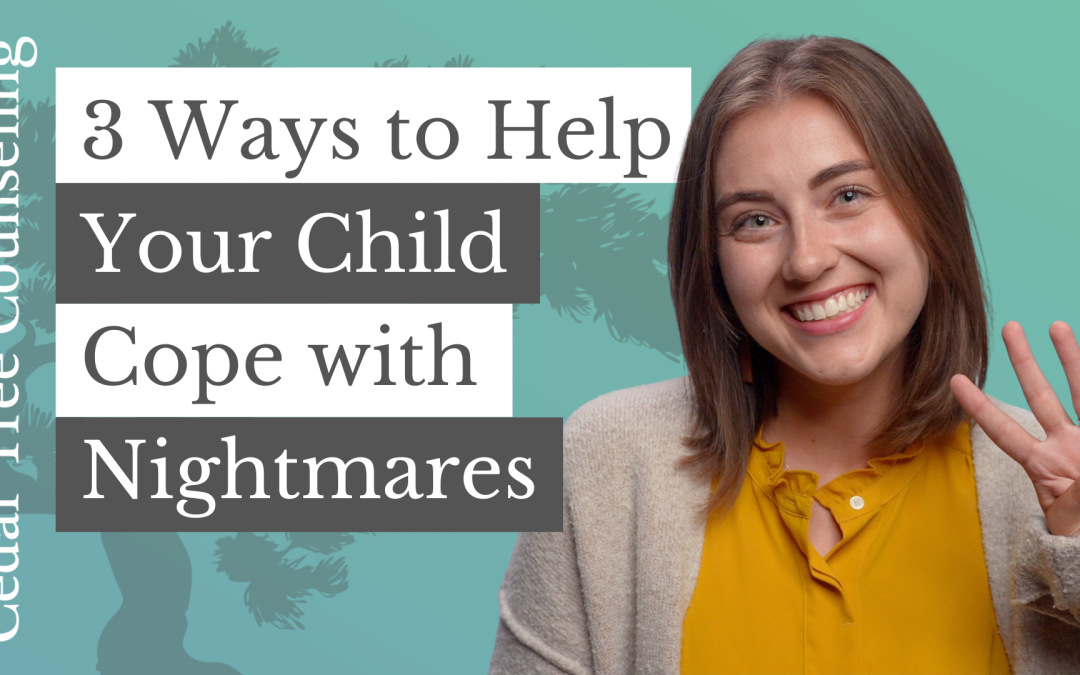Nightmares can be a distressing experience for anyone, particularly children who have experienced trauma and are dealing with PTSD. As a loving parent or caregiver, you may feel helpless when your child wakes up in the middle of the night, terrified by their recurring nightmares.
However, there are strategies you can implement to support them during these difficult moments.
Hi, I’m Ali Litavsky, a therapist at Cedar Tree Counseling, and in this article, I share three ways to help your child cope with PTSD-related nightmares.
Create a Safe & Comforting Environment
Ensure that your child’s bedroom feels safe and secure. Soft lighting, cozy bedding, and comforting objects such as stuffed animals can help create a soothing atmosphere.
It’s also important to not have screen-time a few hours before bedtime. So don’t take any screens into the bedroom right before bedtime.
Encourage your child to participate in creating this environment, allowing them to choose items that bring them comfort. By doing so, you’re empowering your child and helping them take ownership of their safe space.
Establish a Relaxation Routine
Teaching your child relaxation techniques can provide them with tools to manage anxiety and promote restful sleep.
One example of a relaxation technique that can be taught to children is progressive muscle relaxation. This involves having your child tense and relax muscles throughout their body to release tension and promote relaxation.
You can also try visualization exercises that involve guiding the child to imagine a peaceful and calming scene or situation.
Finally, practice deep breathing exercises or guided meditation together before bedtime. Engage their senses by using calming essential oils or playing relaxing music.
This routine can help your child associate bedtime with relaxation rather than fear.
Encourage Open Communication
Encouraging your child to talk about their nightmares and feelings can be incredibly beneficial. Offer a supportive and nonjudgmental space for them to express themselves.
Some ways to encourage a child to talk about their nightmares include letting them know that you’re always available to listen and talk about their experiences, or by asking open-ended questions, such as “Can you tell me more about what happened in your dream?” or “How did you feel when you woke up from the nightmare?”
Validate their emotions and gently guide the conversation towards positive coping strategies like the ones mentioned above.
Remember, coping with PTSD-related nightmares can be a long journey, but with your love and support, your child can find healing and learn to manage their fears. Stay patient, understanding, and consistent in implementing these strategies.
And if you find that you need additional support don’t hesitate to schedule an appointment today. Together, we can help your child navigate their nightmares and move towards a more peaceful night’s rest.

Ali Litavsky
Children
I understand the complexities and struggles kids face today, and I believe they can be overcome. That’s why I provide a safe space for children and their families that fosters emotional well-being and lasting resilience.
Choose A Topic!
Cedar Tree's Mission:
There are a lot of broken families who struggle to do life well together.
That’s why we help families create an environment where deeper connection & healing can happen.
GENEVA OFFICE
2172 Blackberry Drive, Suite 202
Geneva, IL 60134
(630) 797-9872
*By Appointment Only*
HINSDALE OFFICE
15 Spinning Wheel, Suite 125
Hinsdale, IL 60521
(630) 797-9872
*By Appointment Only*


